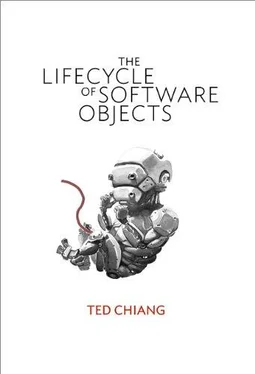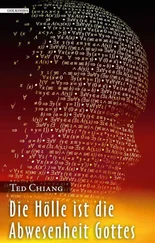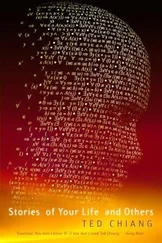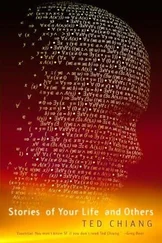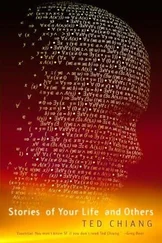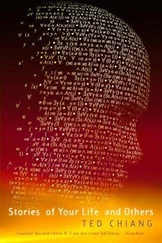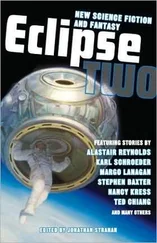The Lifecycle of Software Objects
by Ted Chiang
Her name is Ana Alvarado, and she’s having a bad day. She spent all week preparing for a job interview, the first one in months to reach the videoconference stage, but the recruiter’s face barely appeared onscreen before he told her that the company has decided to hire someone else. So she sits in front of her computer, wearing her good suit for nothing. She makes a halfhearted attempt to send queries to some other companies and immediately receives automated rejections. After an hour of this, Ana decides she needs some diversion: she opens a Next Dimension window to play her current favorite game, Age of Iridium.
The beachhead is crowded, but her avatar is wearing the coveted mother-of-pearl combat armor, and it’s not long before some players ask her if she wants to join their fireteam. They cross the combat zone, hazy with the smoke of burning vehicles, and for an hour they work to clear out a stronghold of mantids; it’s the perfect mission for Ana’s mood, easy enough that she can be confident of victory but challenging enough that she can derive satisfaction from it. Her teammates are about to accept another mission when a phone window opens up in the corner of Ana’s video screen. It’s a voice call from her friend Robyn, so Ana switches her microphone over to take the call.
“Hey Robyn.”
“Hi Ana. How’s it going?”
“I’ll give you a hint: right now I’m playing AoI.”
Robyn smiles. “Had a rough morning?”
“You could say that.” Ana tells her about the canceled interview.
“Well, I’ve got some news that might cheer you up. Can you meet me in Data Earth?”
“Sure, just give me a minute to log out.”
“I’ll be at my place.”
“Okay, see you soon.” Ana excuses herself from the fireteam and closes her Next Dimension window. She logs on to Data Earth, and the window zooms in to her last location, a dance club cut into a giant cliff face. Data Earth has its own gaming continents–Elderthorn, Orbis Tertius–but they aren’t to Ana’s taste, so she spends her time here on the social continents. Her avatar is still wearing a party outfit from her last visit; she changes to more conventional clothes and then opens a portal to Robyn’s home address. A step through and she’s in Robyn’s virtual living room, on a residential aerostat floating above a semicircular waterfall a mile across.
Their avatars hug. “So what’s up?” says Ana.
“Blue Gamma is up,” says Robyn. “We just got another round of funding, so we’re hiring. I showed your resume around, and everyone’s excited to meet you.”
“Me? Because of my vast experience?” Ana has only just completed her certificate program in software testing. Robyn taught an introductory class, which is where they met.
“Actually, that’s exactly it. It’s your last job that’s got them interested.”
Ana spent six years working at a zoo; its closure was the only reason she went back to school. “I know things get crazy at a startup, but I’m sure you don’t need a zookeeper.”
Robyn chuckles. “Let me show you what we’re working on. They said I could give you a peek under NDA.”
This is a big deal; up until now, Robyn hasn’t been able to give any specifics about her work at Blue Gamma. Ana signs the NDA, and Robyn opens a portal. “We’ve got a private island; come take a look.” They walk their avatars through.
Ana’s half expecting to see a fantastical landscape when the window refreshes, but instead her avatar shows up in what looks at first glance to be a daycare center. On second glance, it looks like a scene from a children’s book: there’s a little anthropomorphic tiger cub sliding colored beads along a frame of wires; a panda bear examining a toy car; a cartoon version of a chimpanzee rolling a foam rubber ball.
The onscreen annotations identify them as digients, digital organisms that live in environments like Data Earth, but they don’t look like any that Ana’s seen before. These aren’t the idealized pets marketed to people who can’t commit to a real animal; they lack the picture-perfect cuteness, and their movements are too awkward. Neither do they look like inhabitants of Data Earth’s biomes: Ana has visited the Pangaea archipelago, seen the unipedal kangaroos and bidirectional snakes that evolved in its various hothouses, and these digients clearly didn’t originate there.
“This is what Blue Gamma makes? Digients?”
“Yes, but not ordinary digients. Check it out.” Robyn’s avatar walks over to the chimp rolling the ball and crouches down in front of it. “Hi Pongo. Whatcha doing?”
“Pongo pliy bill,” says the digient, startling Ana.
“Playing with the ball? That’s great. Can I play too?”
“No. Pongo bill.”
“Please?”
The chimp looks around and then, never letting go of the ball, toddles over to a scattering of wooden blocks. It nudges one of them in Robyn’s direction. “Robyn pliy blicks.” It sits back down. “Pongo pliy bill.”
“Okay then.” Robyn walks back over to Ana.”What do you think?”
“That’s amazing. I didn’t know digients had come so far.”
“It’s all pretty recent; our dev team hired a couple of PhDs after seeing their conference presentation last year. Now we’ve got a genomic engine that we call Neuroblast, and it supports more cognitive development than anything else currently out there. These fellows here”–she gestures at the daycare center inhabitants–”are the smartest ones we’ve generated so far.”
“And you’re going to sell them as pets?”
“That’s the plan. We’re going to pitch them as pets you can talk to, teach to do really cool tricks. There’s an unofficial slogan we use in-house: ‘All the fun of monkeys, with none of the poop-throwing.’”
Ana smiles. “I’m starting to see where an animal-training background would be handy.”
“Yeah. We aren’t always able to get these guys to do what they’re told, and we don’t know how much of that is in the genes and how much is just because we aren’t using the right techniques.”
She watches as the panda-shaped digient picks up the toy car with one paw and examines the underside; with its other paw it cautiously bats at the wheels. “How much do these digients start out knowing?”
“Practically nothing. Let me show you.” Robyn activates a video screen on one wall of the daycare center; it displays footage of a room decorated in primary colors with a handful of digients lying on the floor. Physically they’re no different from the ones in the daycare center now, but their movements are random, spasmodic. “These guys are newly instantiated. It takes them a few months subjective to learn the basics: how to interpret visual stimuli, how to move their limbs, how solid objects behave. We run them in a hothouse during that stage, so it all takes about a week. When they’re ready to learn language and social interaction, we switch to running them in real time. That’s where you would come in.”
The panda pushes the toy car back and forth across the floor a few times, and then makes a braying sound, mo mo mo. Ana realizes that the digient is laughing. Robyn continues, “I know you studied primate communication in school. Here’s a chance to put that to use. What do you think? Are you interested?”
Ana hesitates; this is not what she envisioned for herself when she went to college, and for a moment she wonders how it has come to this. As a girl she dreamed of following Fossey and Goodall to Africa; by the time she got out of grad school, there were so few apes left that her best option was to work in a zoo; now she’s looking at a job as a trainer of virtual pets. In her career trajectory you can see the diminution of the natural world, writ small.
Читать дальше
